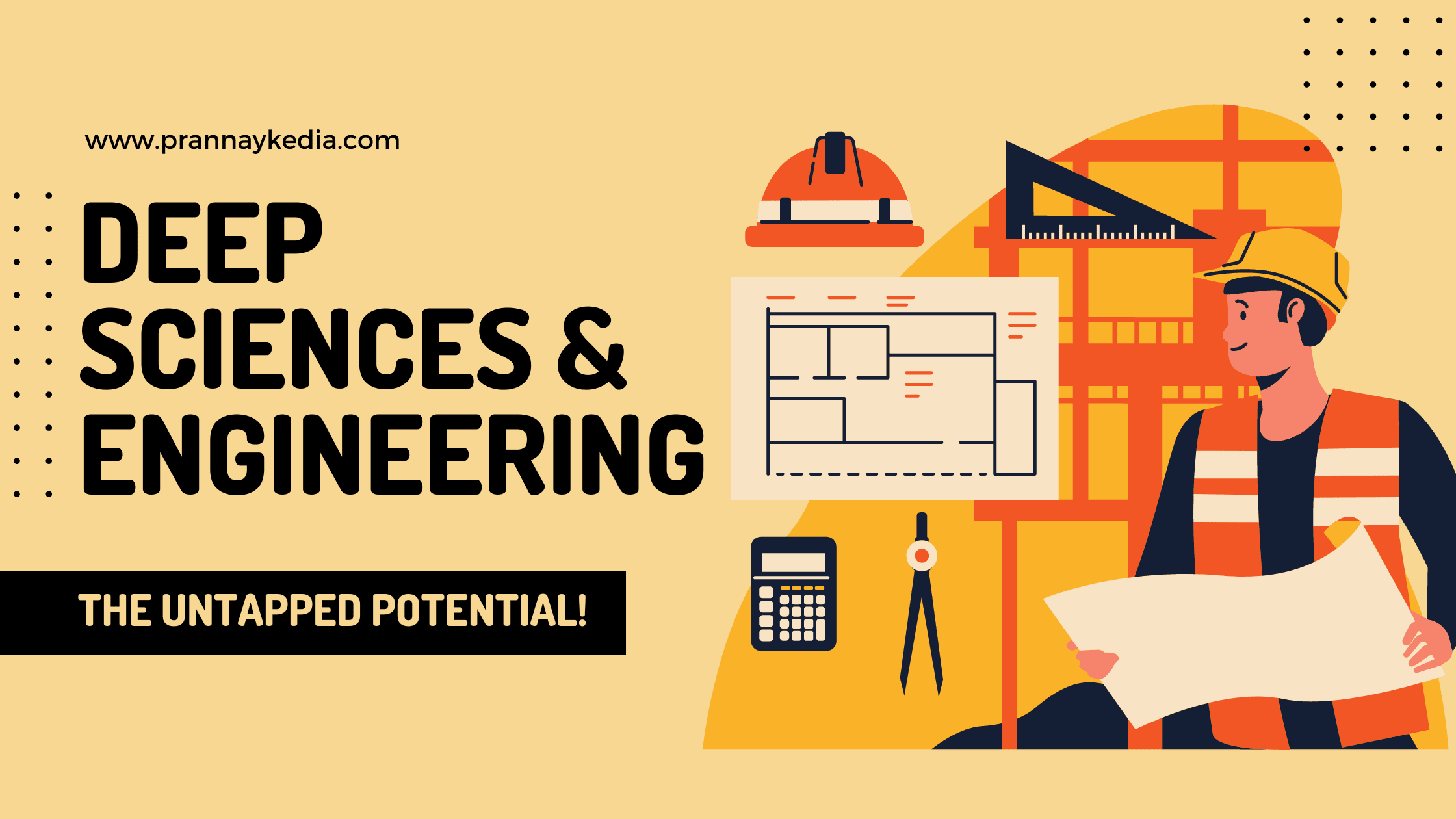Starting Up in Deep Sciences and Engineering: The Untapped Potential!
March 01, 2023

March 01, 2023

With the advent of technology, deep sciences and engineering doesn't get the attention it deserves. We celebrate even the slightest advancement in Computer Science but don't applaud massive breakthroughs happening in other fields. Something as simple as the use of ethanol in Petrol can have a massive and long-lasting impact on the environment and our economy. Engineering and science has revolutionized the world and continues to do so on a day-to-day basis. Yet it is not celebrated enough both in terms of media coverage and appreciation.
The chemical engineering department at Jadavpur University (the oldest in Asia) celebrated its 100-year anniversary from the 25th to the 27th of February. As a student of the department & an organiser, I had the privilege to witness the speeches of luminaries of Chemical Engineering such as Prof M.M. Sharma, Prof R.A. Mashelkar, and Prof G.D. Yadav amongst others. They spoke about the future of chemical engineering focusing on areas such as:
Each of the above is a massive multi-billion dollar industry in itself and can change the world as we know it. My one key takeaway from the event was that the business & start-up ecosystem in India must celebrate breakthroughs in engineering sciences and should promote the commercialisation of laboratory research.
While we speak about Brain Drain which is the emigration of talent from a country, we must also speak about the brain drain happening in the core engineering fields. Talented engineers leave their core competencies and move into IT. I am guilty of this too. As a chemical engineer, I too didn't pursue an idea in my field of study but chose to start up with a concept in artificial intelligence for writers. This brain drain is happening simply due to the lack of pay and glamour in the engineering world.
With the massive in-flow of venture capital money into tech start-ups, companies have massive amounts of money to splurge on incoming software engineers. This inflates the starting salaries of fresh graduates in the IT industry. This is a bubble and this bubble bursts regularly leaving thousands and even lakhs of people jobless. This bubble burst recently towards the end of 2022 when tech companies laid off lakhs of people across the globe. Had they hired sensibly and at reasonable salaries, they wouldn't have had to take such drastic cost-cutting steps affecting the lives of thousands of people.
On the other side of the coin is the core engineering world, which is comparably more difficult to break into and offers significantly lower starting pay. What it does offer is a steady path to growth. Engineers with experience in the industry are highly paid and often more in demand than software engineers with similar years of experience. This is because the work engineers do become highly complex and specialised as time passes on. The process modelling and design of a massive Blast Furnace is only something a very experienced Metallurgical Engineer can do well.
I already discussed how VC money leads to inflation in engineer salaries which create 2 major issues:
Beyond the 2 very concerning problems, the third issue crumples the entire core engineering ecosystem. Lack of funding from popular Venture Capital firms and consequently the lack of glamour leads to fewer start-ups in the space. Venture Capital runs with a singular focus - unprecedented growth. By their very nature, only tech companies have the potential to scale up their offerings overnight and deliver growth at the rate acceptable to venture capitalists. While I understand the requirements of a VC, the problem is with the media coverage of the business world. VCs across the world have tied up with various media houses and the only news you ever get to witness is about some company raising millions of dollars in VC money. It is important to celebrate big wins in this space, but it is equally important if not more to celebrate entrepreneurs working day in and day out to commercialise engineering marvels done in the laboratory.
In the present ecosystem, we expect massive corporations to take the onus of commercialising lab research while the start-up ecosystem focuses on creating tech products. This can be seen clearly through the funding data of companies in the chemical and mechanical engineering space. Start-up accelerators are the primary backers of these companies. The Government of India has also done a phenomenal job of providing engineering & science-heavy companies with adequate resources through grants, schemes and organisations like Start-up India, Birac, and DST amongst others. We need to incorporate the brilliance of the Indian Engineer in the start-up ecosystem to push India forward into the next decade.
Some ideas which caught my eye were in the conference were:
While there were multiple such topics which are worth discussing, I'll not mention them here. You can check out the various lectures on my department's website. I realise the hypocrisy of this article. I do not have the right to speak about the brain drain in the engineering fields when I have switched subjects with Writee. This article is the outcome of an introspection. After the conference, I was wondering why I chose to not pursue something related to chemical engineering and the answers I got prompted this article. I also want to mention that this is in no way a comprehensive account of all my thoughts. I have presented just one-side of a multi-faceted and complex story. You'd have to reach out to me for a more nuanced conversation on the matter.